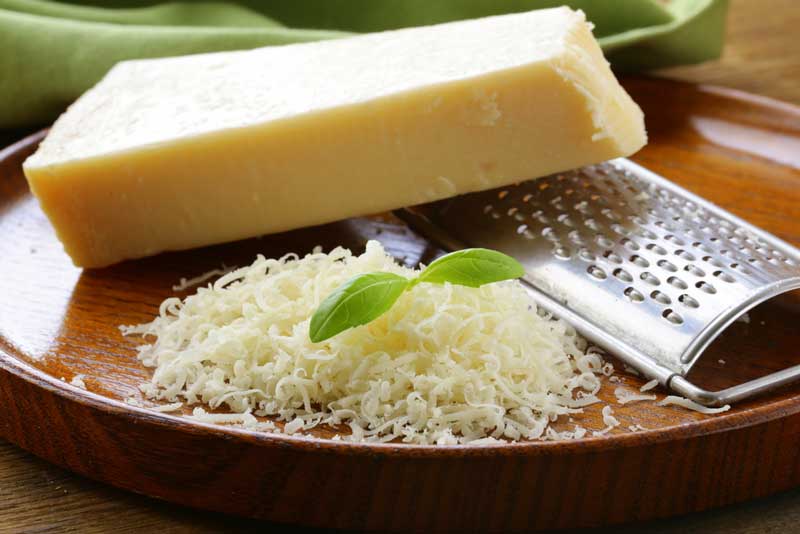If you want super tasty and yummy food, go for parmesan cheese! This old-school Italian cheese has been around forever, and it’s no surprise it’s still a favorite in kitchens worldwide.
But here’s a crucial question for cheese lovers who know that a fantastic pasta dish requires a cheesy topping. Does parmesan cheese melt?
If you’ve had prior experience handling parmesan cheese, you may have encountered instances where it doesn’t melt as desired. So, what’s the reason behind this? Why does it happen?
Parmesan cheese will only melt slowly, given its tough texture. But, if you give it enough time, it is possible for freshly grated parmesan to soften nicely. On the flip side, processed blocks of parmesan are very stubborn and hard to melt without burning them.
Does Parmesan Cheese Melt?
You might be surprised, but hard cheeses like parmesan can melt. Melted parmesan cheese is the bomb in spaghetti carbonara and chicken parmesan. But why do some people think parmesan cannot be melted?
The answer is that parmesan cheese melts easier when it is fresh and there are fewer preservatives. You see, parmesan cheese has this enzyme called rennet that softens the milk structure when heated.
So when it comes to parmesan not melting, it often boils down to the type of parmesan you’re dealing with.
Different Kinds of Parmesan Cheese
If you love pasta, you’re probably well acquainted with parmesan cheese. It’s a delicious topping that adds flavor to many pasta dishes and sauces. However, if you’re unfamiliar with it, don’t worry! You’re in the right place to learn all about it!
Before we explore the world of parmesan cheese, we must familiarize ourselves with the different types of parmesan cheese and what sets them apart.
So let’s get started.
Parmigiano-Reggiano:
When we talk about parmesan, most of us are referring to Parmigiano-Reggiano. It’s considered the finest quality among Italian hard cheeses and is often called “The King of Cheeses.” But let’s not mention that to the French, who are really into Roquefort!
Pecorino Romano:
While Pecorino Romano shares a similar texture with Parmigiano-Reggiano, its similarities end there.
Pecorino Romano is a unique cheese made from sheep’s milk, not cow’s milk, like most other cheeses. It’s aged for about five to eight months. Most of it is made in Sardinia in Italy, but they also produce it in Grosseto and Lazio.
Grana Padano:
Grana Padano is another hard cheese made from cow’s milk, just like Parmigiano-Reggiano. The production region for Grana Padano is more extensive, and it has a more relaxed minimum aging requirement of nine months.
Because of these factors, Grana Padano has a slightly sweeter and less intense taste than Parmigiano-Reggiano; it’s also a more budget-friendly option.
Also Read: Does Feta Cheese Melt? (Everything To Know) and How Long Is Ceviche Good For? (Explained)
How Long Does It Take for Parmesan Cheese to Melt?
Here’s the scoop on how long it takes for parmesan to melt – it’s a bit of a mixed bag. It all comes down to the fact that it varies and has no set answer.
It also depends on whether you’re working with authentic, heavily-processed, or high-quality parmesan. That makes a difference too.
If you’ve got the real deal, it’s a game changer. It needs just a touch of warmth, and it’ll transform into a buttery supplement to your dip.
If you’re under the impression that you have fresh parmesan and grate it over your sauce but it stubbornly refuses to melt, it indicates that it’s neither new nor genuine.
On the other hand, it could also be due to using a lower-quality parmesan, resulting in clumpy textures instead of the desired creamy and melted consistency.
Oftentimes, you can never really know if your parmesan cheese is the good stuff until it won’t melt nicely into your sauce.
If it’s legit and top-notch, it should melt right away. But if it’s not the best quality, you might have to put in some serious effort for about 8-10 minutes to get it to melt without getting stretched out and clumpy.
What Type of Parmesan Cheese Melts Best?
Now, you might wonder, “What kind of parmesan cheese melts the best?” Before we get to that, you should know that Parmigiano-Reggiano is authentic parmesan cheese.
If you want to call parmesan cheese genuine, it has to be made in Italy. However, even though the parmesan cheese we love isn’t Parmigiano-Reggiano, it can still be just as delicious as the original.
So here’s a point, if you want your parmesan to melt, it has to be fresh, whether it’s the real deal or not. The hardness of the cheese is a good indicator of its freshness.
Parmesan is like the VIP of cheeses when it comes to lasagna and pasta. It’s all about that perfect mix, whether you’re throwing it into different pasta dishes or getting creative with zucchini parmesan.
That nicely grated parmesan you sprinkle on your cooked pasta or pizza? Don’t expect it to melt – it’s meant to bring out the flavors and give you that fantastic cheesy texture.
When the cheese goes through thorough processing, it loses all its melting magic. But it’s a bit of both when it comes to shredded parmesan. Some might melt, while others might get a little gooey.
The key factors influencing the melting behavior are the freshness of the parmesan and the extent of processing it has undergone.
At What Temperature Does Parmesan Cheese Melt?
Believe it or not, parmesan has a shallow melting point. Thanks to the magic of rennet, an enzyme found in it, the milk curds in parmesan cheese can quickly melt when exposed to relatively high temperatures.
On average, parmesan starts melting at around 180 degrees Fahrenheit, but you should know that softer cheeses can melt even at lower temperatures, like 130-140 degrees Fahrenheit. That’s why it’s a bomb-thickening sauce, giving them that salty, lip-smacking goodness.

How Can Parmesan Cheese Be Melted
So, we’ve learned that parmesan cheese can melt but sometimes only melts more slowly than the other cheeses. Why? Well, parmesan has less moisture than different soft cheeses. It also has more salt and milkfat going on. These factors make it a bit stubborn to melt smoothly.
But don’t get discouraged yet. Let’s talk about how to fix the problem.
Here are a few pointers for getting that parmesan cheese to melt just right:
- Go for freshly grated parmesan cheese:
If you’re dealing with pre-grated and dry parmesan cheese, melting it will be more challenging. Switch things up by using fresh parmesan cheese or shredding it yourself. This plays a vital role in helping it melt.
You can also try finely grated cheese since it creates more surface area, evenly ensuring the inside and outside heat.
- Add a small amount of liquid:
Add a liquid splash like broth or milk if your parmesan cheese is stubborn. It helps to thin out the cheese and make it melt more smoothly. Stay moderate with the liquid, or you’ll end up with a watery mess.
- Opt for a lower heat setting:
Beware of excessive heat when melting parmesan cheese. If you throw it into a boiling soup or use high heat, it will get all clumpy and greasy. Take it slow instead and steady with lower heat to melt the cheese smoothly.
That way, you’ll avoid the fat separating from the proteins.
- Make sure to give it a good stir:
Frequent stirring is vital to achieving even melting of the cheese. Give it a good stir to help it melt consistently throughout.
Also, remember that if your parmesan is straight out of the fridge, it will be harder to melt. You can allow it to come to room temperature by leaving it on the counter for 30-60 minutes before melting.
Frequently Asked Questions-Does Parmesan Cheese Melt?
Is It Okay To Cook Parmesan Cheese?
Absolutely! In fact, here’s a tasty trick: shred the parmesan and throw it into your soups and stews. Let it simmer in the broth, and watch as it works its magic, infusing your dish with its incredible flavor. Add it to risotto or pasta dishes when it’s ready for an extra punch.
You can even grill them and use them as a topping for salads or pizzas. Parmesan cheese has a lot of flavor potential!
Is Parmesan Cheese Good for Melting?
Parmesan cheese is not always the best cheese for melting. Usually, you don’t melt Parmesan cheese in the sauce because it’s a hard cheese that doesn’t melt well. It tends to clump up when it gets hot, so it’s not the best choice for melting.
Going with a softer cheese like cheddar is better if you want a creamy cheese sauce.
Does Mozzarella Melt Better Than Parmesan?
The answer is yes. Mozzarella, more often than not, melts better than parmesan. Mozzarella has more moisture, and this is great for melting. It gets gooey and delicious.
But parmesan, especially Parmigiano-Reggiano and aged Gouda, is drier and will only melt better if moisture is involved.
Does Parmesan Cheese Need To Be Refrigerated?
Keeping soft cheeses like cottage cheese, goat cheese, and cream cheese in the fridge would be best to stay safe. But when it comes to hard cheeses like parmesan, you don’t have to refrigerate them for safety reasons.
However, if you want them to last longer, it’s a good idea to pop them in the fridge anyway. Better safe than sorry, right?
Is Parmesan Cheese Tasty?
Parmesan cheese has a firm and granular texture, but it’s packed with nutty flavors that make it super tasty. You’ll often find it mixed into soups or grated on pasta dishes to add a delicious twist.
You can even munch on it as a snack all by itself! Just know that making Parmesan cheese takes 2 to 4 years of aging to get that perfect flavor. Patience pays off when it comes to parmesan!
Also Checkout: What Do Goji Berries Taste Like? (Full Details) and What Do Grits Taste Like? (Explained)
Conclusion-Does Parmesan Cheese Melt?
Now that you’ve got the lowdown on what makes parmesan cheese melt, you must know what type of cheese you’re working with.
It will likely melt well if you’re dealing with young cheese. This also applies to processed cheese. On the other hand, as cheese undergoes more processing or aging, it tends to become clumpy rather than melt smoothly.
Remember, to melt your Parmesan cheese like a pro, you need to keep an eye on the cheese you’re using. Choose the right type, and pray that your pasta and Alfredo sauce never suffer from clumps. Here’s to smooth, cheesy goodness every time you cook!

